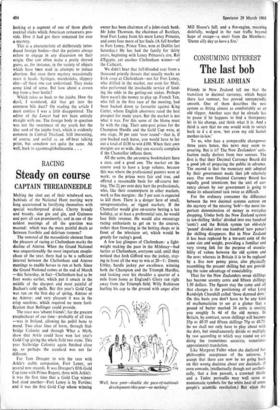„Steady on course
RACING CAPTAIN TIIREADNEEDLE
Melting the sleet out of their windward ears, habitues of the National Hunt meeting were long accustomed to fortifying themselves with special weatherproof drinks. Cherry brandy and brandy, sloe gin and gin, and Guinness and port all ran prominently; and in one of the coldest meetings of all the question was mooted: which was the more painful death as between frostbite and delirium tremens?
The removal of the masochistic element from the pleasure of racing at Cheltenham marks the decline of Aintree. When the Grand National was unquestionably the most important steeple- chase of the year, there had to be a sufficient interval between the Cheltenham and Aintree meetings to enable horses to run at both. Since the Grand National comes at the end of March —this Saturday, in fact—Cheltenham had to be four weeks earlier, which put it smack in the middle of the sharpest and most painful of Buchan's cold spells. But this year's Gold Cup was run on the first day of spring, Aintree or no Aintree; and very pleasant it was in the crisp sunshine, which required no more forti- fication than Bollinger could provide.
The toast was 'absent friends'; for the greatest steeplechaser of our time—probably of all time —was in Ireland, allowing his pedal bone to mend. Two clear lines of form, through Stal- bridge Colonist and through What a Myth, show that Arkle could have won last year's Gold Cup giving the whole field two stone. This year Stalbridge Colonist again finished close up, so perhaps the standard was not far different.
For Tom Dreaper to win the race with Arkle's stable companion, Fort Leney, set several new records. It was Dreaper's fifth Gold Cup (one with Prince Regent, three with Arkk): it was the first time that a Gold Cup winner had sired another—Fort Leney is by Fortina; and it was the first Gold Cup whose winning owner has been chairman of a joint-stock bank. Mr John Thomson, the chairman of Barclays, bred Fort Leney from his mare Leney Princess, and owns four more of her foals. (A full brother to Fort Leney, Prince Tino, won at Dublin last Saturday.) He has had the family for thirty years, beginning with Leney Princess's sire, Roi d'Egypte, yet another Cheltenham winner—of the Cathcart.
We didn't hear that full-blooded roar from a thousand priestly throats that usually marks an Irish coup at Cheltenham—not for Fort Leney, who drifted in the market, nor even for Muir, who performed the invaluable service of land- ing the odds in the getting-out stakes. Perhaps there wasn't the money to play up. French Tan, who fell in the first race of the meeting, had been backed down to favourite against King Cutler, whom English observers rated the best prospect for many years. B,ut the market is not what it was. For this some of the blame must lie with the ring. Their ante-post prices for the Champion Hurdle and the Gold Cup were, at one stage, 30 per cent 'over round'—that is, if you backed each horse, you would have to lay out a total of £130 to win £100. When their own margins are so wide, they can scarcely complain if the Chancellor inflates them.
All the same, the on-course bookmakers have a case, and a good one. The market on the course used to have a large volume, because this was where the professional punters were at work; so the prices were fair and true, and offered a reasonable basis for off-course bet- ting. The 21 per cent duty hurt the professionals, who, like their counterparts in other markets, work to fine margins: the 5 per cent is expected to kill them. There is a danger here of small, unrepresentative, or rigged markets. If the Chancellor would give on-course betting a tax holiday, or at least a preferential rate, he would lose little revenue. He would also encourage racing enthusiasts to get on to the courses, rather than frowsting in the betting shops or in front of the television set; which would be greatly for racing's good.
A few last glimpses of Cheltenham: a light- weight making the pace in the Mildmay—bad tactics at Cheltenham, everyone said, until they noticed that Josh Gifford was the jockey, stay- ing in front all the way to win at 20-1: Jimmy Uttley, hurdle jockey par excellence, winning both the Champion and the Triumph Hurdles, and looking over his shoulder a quarter of a mile from home as England's Glory ran right away from the Triumph field; Willy Robinson hurling his cap to the ground with anger after 'Well, here goes—double the pace-of-national- development-this-year—or nothing.' Mill House's fall; and a fire-engine, moaning dolefully, wedged in the race traffic beyond hope of escape—a snort from the Members : 'Damn silly day to have a fire.'






































 Previous page
Previous page